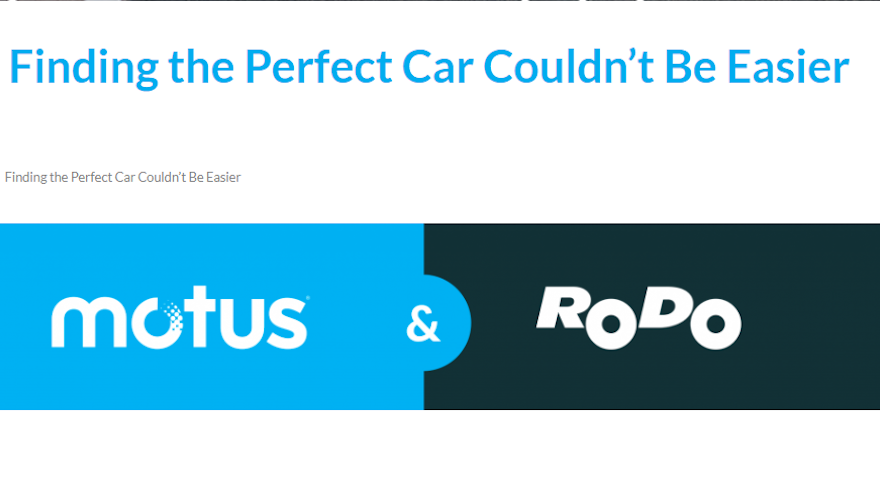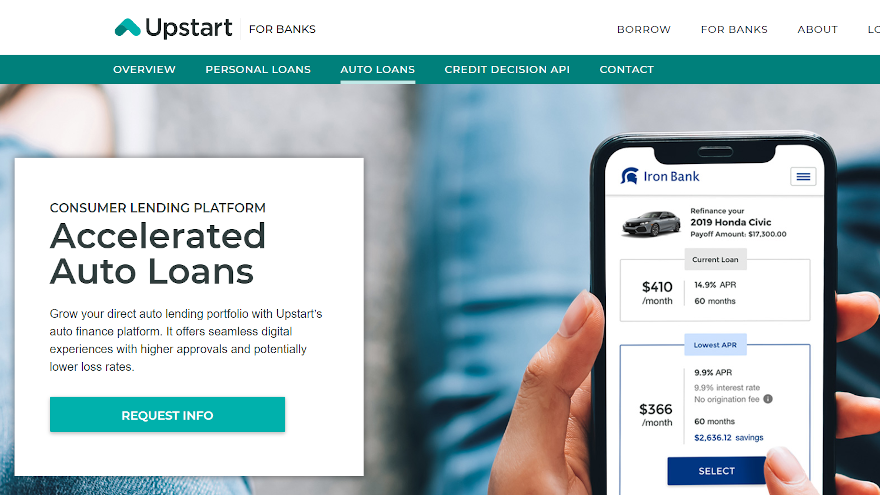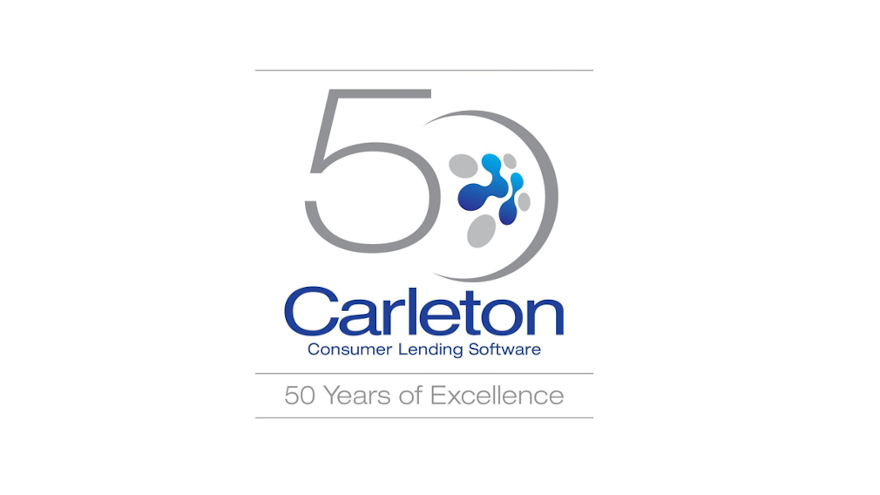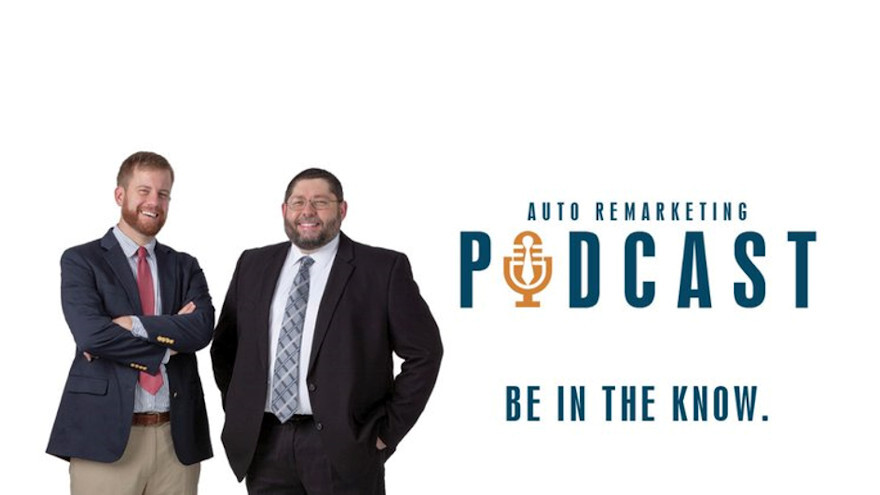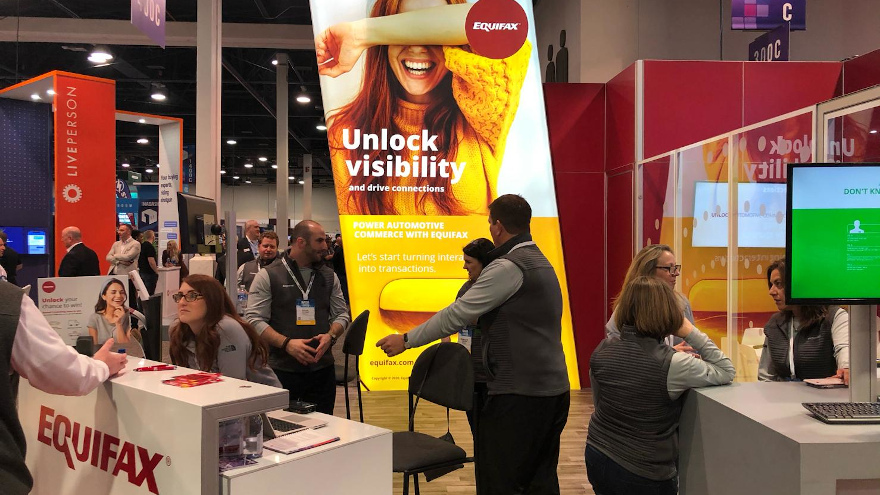Rodo — the online vehicle leasing startup and Emerging 8 honoree that first entered the marketplace known as Honcker — recently announced a partnership with Motus, a provider in reimbursement solutions for businesses with mobile-enabled workers.
The companies explained their relationship is designed to simplify vehicle buying and financing through the Rodo app for the hundreds of thousands of business drivers who already rely on Motus for vehicle reimbursement.
“Rodo is the fastest and easiest way to lease or purchase a new vehicle safely—without ever leaving your home,” Rodo founder and chief executive officer Nathan Hecht said in a news release. “Rodo’s marketplace gives local dealerships across the U.S. the premier platform to make that possible, while providing consumers a digital, on-demand way to safely get into a new car in a matter of minutes.
“We are thrilled to partner with Motus to offer their customers a fast, easy way to obtain a vehicle,” Hecht continued. “Motus drivers will now be able to access the premier car buying experience by seeing actual monthly payments on live inventory from dealerships around them. They can complete transactions on the app and get free home delivery, while also knowing that they’re getting the best deals available.”
Rodo’s solution is geared to offer both dealerships and consumers an easy and seamless transaction with more than 170,000 vehicles from every major manufacturer. With Rodo, dealerships can manage their inventory and pricing to maximize sales and profits.
Consumers can download Rodo’s app to shop, receive personalized transparent lease or finance payments—including all available industry rebates or discounts—and quickly obtain approval.
“Drivers with Motus travel thousands of miles and spend hundreds of hours on the road each year. Their vehicles are highly-used and vital to the work they do each day,” Motus chief strategy officer Todd Gebski said. “We’ve provided innovative solutions that keep them productive and safe on the road, but our partnership with Rodo will now also allow us to provide the mobile workforce with the means to lease or purchase the vehicle of their choice without the fuss of the dealership sales process.
“By partnering with Rodo, we’re bringing extended benefits to our drivers, who can now more easily find the car that suits their needs, obtain the best price available and quickly get behind the wheel,” Gebski went on to say.
To learn more or download the app, visit https://www.motus.com/rodo/.
Artificial intelligence continues to work its way into auto financing.
On Wednesday, Upstart, a leading AI lending platform, announced support for auto financing as part of its consumer lending platform. With Upstart’s new service, the firm highlighted banks can offer refinance and purchase financed contracts with a seamless digital experience, higher approvals and potentially lower loss rates — all enabled by AI.
Upstart explained in a news release that its new service can eliminate the need for consumers to track down and enter their VIN or license plate number. Banks no longer need to manage detailed paperwork including title transfer, lien placement, or payoff of the borrower’s existing installment contract (in the case of refinance).
Upstart’s AI model for auto financing builds off its personal loan model, which has shown itself to be five times more predictive than FICO during the COVID-19 pandemic, according to an internal study by Upstart.
Upstart’s auto model combines a time-delimited probability of default (or prepayment) with the vehicle’s modeled residual value to generate a custom financing offer for each applicant.
In addition, thanks to Upstart’s seamless digital experience, banks can achieve Net Promoter Scores (NPS) scores far higher than published benchmarks for the largest banks. The Net Promoter Scores for its bank partners’ current lending programs are approximately 80 compared with less than 30 NPS at top-tier banks, based on a survey of loan applicants administered by a third party.
Features of Upstart’s auto platform also include:
— Bank branded, mobile-friendly application that allows users to finish their application in one sitting
— Seamless vehicle lookup via integration with DMV records without requiring VIN or license plate from applicants
— Risk-based AI model prices customers within the bank’s credit and vehicle policy resulting in higher approvals and lower losses
— Automated fraud and verification of customer application information mean borrowers can finish their application in as little as 20 minutes
— Integrated title management including placing and releasing liens plus transferring titles
— Seamless disbursement of funds either to dealerships, the borrower, the prior lender (for refinance)
“Personal loans were the right first step for AI lending — now, we’re expanding to auto,”, of Upstart co-founder and chief executive officer Dave Girouard said. “The days of randomly priced auto loans with confusing and laborious processes both for consumers and banks are nearing their end.”
For more information, visit www.upstart.com/for-banks/auto-loans/.
Carleton is in celebration mode.
In 2020, the company is marking its golden anniversary as a provider of compliant consumer lending origination computations and complimentary document generation solutions. Throughout the last half-century, Carleton’s products have enabled finance companies and lenders to compliantly close loans and installment contracts in the highly regulated industry of consumer finance.
Carleton's role in the industry began when its original founder, Joseph Carleton Pitts, served on the advisory board responsible for crafting Appendix J contained in the 1969 Truth in Lending Act. Appendix J defined the annual percentage rate (APR) guidelines and disclosure requirements.
“This new regulation created an ideal platform for Carleton to produce payment charts that incorporated the APR for lenders nationwide,” the company said.
By 1975, Carleton was generating payment charts that included credit insurance products for virtually all the major finance companies and credit insurance companies in the United States. Since then the lending industry has relied on Carleton to provide payment calculations in compliance with more than 300 lending and credit insurance regulations at both the federal and state level.
Carleton emphasized that one of primary points of differentiation has been its commitment to providing federal and state compliance support “in real time” within its consumer lending solutions and consulting services.
Carleton’s compliance group is led by Jeff Buysse, who has over 30 years of compliance expertise, and includes two full-time attorneys who monitor, evaluate and leverage their in-depth knowledge of consumer finance regulations.
“We believe the many years of collective experience of Carleton’s management team in the consumer finance arena provides a high degree of ‘peace of mind’ for our clients,”, Carleton president and chief operating officer Matt Ruszkowski said in a news release. “Those clients can have absolute confidence that our compliance expertise and high-level support will assure their lending solutions will be accurate and remain in full compliance now and into the future.
“We take pride in our long tenure of service to the industry and we look forward to continuing to successfully meet and exceed our client’s lending needs for the next 50 years — and beyond,” Ruszkowski continued.
Carleton went on to mention that it has continued to adapt its loan quoting and origination calculation solutions leveraging the latest in technology and the lending environment. Today, many national lenders and major lending platforms in the automotive, banking, and credit union industry utilize Carleton’s current suite of products, including CarletonCalcs, CarletonDocs, CarletonAccess, and CarletonAudit for all types of consumer loans and leases offered in the United States and Canada.
In addition, Carleton is initiating the next half century of service with the introduction of its newest lending software solutions — Carleton CarCalcs and CarletonConnect.
Carleton CarCalcs consists of APIs tailored for performing automotive retail or lease calculations for multiple interest rates, terms, down payments in a single call. Carleton CarCalcs utilizes the popular CarletonCalcs platform to perform all required calculations needed for computing payments related to purchasing, financing, or leasing a vehicle.
In addition, Carleton CarCalcs can compute the following fees and taxes:
— State and local sales tax
— State Registration and Title fees
— State dealer fees (doc fees, tire fees, temporary plates, lemon law, electronic filing, acquisition, and many more)
CarletonConnect can adds greater versatility to CarletonDocs by supporting multiple third-party document providers and eSignature technologies that have partnered with Carleton.
As fintech partners continue their ROI-driven quest for efficiencies and reduced integration operating costs, the company stressed that CarletonConnect can provide an intriguing and cost-effective alternative to supporting a myriad of document and electronic signature integration points.
“Our proven compliant loan calculation and document generation expertise combined with our ability to change our lending solutions to adapt to the everchanging technology space is why we are celebrating our 50th anniversary,” Carleton chief executive officer Pat Ruszkowski said.
“It is very exciting for me to see the next generation of Carleton professionals continue to embody our core values in this exciting lending environment. We have never had stronger software solutions or experienced staff to serve our partners and clients,” Pat Ruszkowski went on to say.
For more details, go to go to www.carletoninc.com or contact Pete Radike, director of client and channel engagement at (800) 433-0090, ext. 245, or [email protected].
Carleton president and chief operating officer Matt Ruszkowski still often sees it on dealership websites nowadays. The vehicle listing tells potential buyers to “call for price.”
During this podcast, Ruszkowski spoke about how crucial it is for dealers to offer specifics about the retail and financing costs to shoppers — including fees and taxes — and how online tools can compute those figures.
To listen to this episode, click on the link available below, or visit the Auto Remarketing Podcast page.
Download and subscribe to the Auto Remarketing Podcast on iTunes or on Google Play.
On Monday, CDK Global announced the launch of Sign Anywhere, its new remote electronic signing solution.
And Volkswagen is among the first to offer Sign Anywhere at VW dealerships through its captive — VW Credit.
Through the innovative remote signing capabilities of Sign Anywhere, CDK Global highlighted that dealers can offer customers a secure, quick, and convenient way to electronically sign the majority of F&I forms needed to purchase a vehicle without having to be present at the dealership.
With Sign Anywhere, dealers also can receive funding in hours following a vehicle purchase.
The tool is a free addition to customers who have CDK eSign, according to a news release.
“CDK continues to invest in products that will help our customers accelerate their digital transformation as we prepare for a new automotive retail landscape,” CDK Global executive vice president and chief product and technology officer Mahesh Shah said.
“Dealers can count on Sign Anywhere to enhance customer experience and expand their digital capabilities beyond the showroom floor without sacrificing time or security,” Shah continued.
CDK Global explained Sign Anywhere houses a portfolio of F&I forms in one secure digital location for dealerships and customers. As part of the solution, dealers can load forms into a digital deal jacket (DDJ). Customers access the forms via multi-factor authentication and can electronically sign those documents at their convenience.
Once customers sign, the company said the dealership can securely proceed with the completion of the sale.
In addition to offering more convenience to customers, CDK Global asserted that Sign Anywhere also can shorten the time it takes compatible finance comapnies to fund completed vehicle purchases for dealers. What typically could take four to six days for lenders, now can be processed in 24 hours or less.
“At CDK, the success of our customers is what drives us, and we feel it is our responsibility to provide tools that will sustain their continued growth today and in the future,” CDK Global vice president of customer success Michael Seeman said.
“With Sign Anywhere, dealerships stand out from the competition with a new omnichannel approach that gives customers convenient options to experience the car-buying process as they choose,” Seeman went on to say.
And one of the earlier adopters of this tool is Volkswagen Group of America and its captive.
According to that same news release, VCI recapped that it immediately recognized Sign Anywhere as a “differentiator” and called on CDK to provide its dealers with the solution.
“VCI and VW not only want to provide world-class vehicles but also world-class car-buying experiences that match the evolving expectations of our customers,” VW Credit president and chief executive officer Anthony Bandmann said.
“Through a collaborative approach that focused first and foremost on the consumer, VCI and CDK worked together on equipping VW with a game-changing solution that is speeding up transactions for customers and providing a new avenue of cash flow for dealerships,” Bandmann added.
To date, CDK Global indicated Sign Anywhere is active in more than 400 VW dealerships and more than 3,600 dealerships across multiple OEMs. Sign Anywhere has also helped complete more than 8,000 vehicle purchases.
In the next six to 12 months, CDK said it intends to add additional captive and national financial institutions to the list of Sign Anywhere compatible finance companies.
Dealers can learn more about the remote signing capabilities of Sign Anywhere, the full eSign solution and the CDK Digital Contracting product portfolio by visiting cdkglobal.com.
Sopra Banking Software recently announced its Cassiopae leasing and financing software is now running live at Hyundai Capital America (HCA) in the United States.
Cassiopae, part of the Sopra Financing Platform, is now the servicing engine for HCA’s financing lifecycle. A key milestone in Hyundai’s global next-generation system rollout, the U.S. launch follows Cassiopae implementations at Hyundai Capital in South Korea and Hyundai China (BHAF).
Despite the unprecedented challenges of the COVID-19 outbreak, Sopra highlighted the 15-month project was delivered on time. The company explained the successful implementation was the result of an agile, trans-global team leveraging centers of excellence in South Korea, India and the U.S. More than 5 million contracts were migrated.
Sopra noted Cassiopae replaced several legacy financing solutions, saving HCA time and cost and enabling the business to keep pace with ever-changing requirements.
Cassiopae is currently managing more than 2 million active HCA contracts. The new system integrates previously separated retail and lease management systems.
Sopra pointed out HCA has already seen a 43% reduction in overlapping data among different functions within the company. Data volume has been reduced by two thirds and the captive expects a significant reduction in data errors.
Sopra went on to mention Cassiopae’s flexibility is enabling HCA to boost its marketing capabilities, making it easier to address changes in market conditions.
“Hyundai Capital America now has an advanced IT system best-optimized for its market,” said Hwanjun Yang, senior vice president and chief information officer at Hyundai Capital America. “The system will help facilitate Hyundai Capital Services’ ambitious global expansion plans.”
Over time, HCA said it expects additional benefits to include reduced time and cost, reduced time to bring new system to other Hyundai entities and better resource sharing among global entities.
Plans for bringing the system to additional Hyundai entities are underway, according to Sopra.
“We are really happy to work with Hyundai in this ambitious international project and to go live in the United States on time despite the Covid-19 situation. We look forward to the next phases of Hyundai’s global roll out,” Sopra Banking Software deputy chief executive officer Eric Bierry said.
Green certainly can have multiple meanings at Toyota Financial Services (TFS).
The captive recently issued its latest unsecured Green Bond, reinforcing the finance company’s commitment to the sale of environmentally friendly vehicles. Officials highlighted proceeds from the $750 million bond will be used to fund the acquisition of new retail installment contracts and operating lease contracts financing Toyota and Lexus vehicles that meet specific clean air criteria, including powertrain, fuel efficiency and emissions.
The company noted there are currently seven vehicle models in the Toyota and Lexus lineup that qualify. With this latest iteration of its Green Bond program, Toyota increased the vehicle eligibility requirements from 35 miles per gallon to 40 miles per gallon.
TFS insisted that it revolutionized the Green Bond market by introducing the auto industry’s first-ever Asset-Backed Green Bond in 2014. This issuance marks the fifth Green Bond the company has issued, and its first ever unsecured Green Bond offered in U.S. dollars.
“Green Bonds are an important component of TFS’ diversified funding program and serve to enhance Toyota’s extensive commitment to environmental causes,” the company said in a news release.
The TFS Green Bond program is unique and enhances Toyota’s reputation for leadership in green innovation across industries. The Toyota Corolla, which includes the Corolla Hybrid, was named the 2020 Green Car of the Year by Green Car Journal. Toyota has sold more than 3.6 million hybrid vehicles in the United States, and more than 13.5 million worldwide.
Since 1997, Toyota hybrids have reduced CO2 emissions by 108 million tons versus comparable gasoline-powered vehicles, according to the company.
“We provide the financing and leasing solutions that enable customers to get into the Toyota or Lexus of their choice,” TFS chief financial officer Scott Cooke said. “Our Green Bonds are an important tool that TFS uses to fund the sale of environmentally friendly vehicles while providing an attractive option for sustainability investors.”
TFS said it has committed to use the proceeds of the Green Bond toward the acquisition of new retail installment contracts and operating lease contracts financing new Toyota and Lexus vehicles that meet each of the three eligibility criteria:
— Possess a gasoline-electric hybrid or alternative fuel powertrain;
— Achieve a minimum of 40 highway and city miles per gallon (MPG or MPG equivalent)
— Receive a Smog Rating of 7 or better (where 10 is the cleanest), as determined by the United States Environmental Protection A agency for the purchase of a vehicle in California.
Qualifying vehicles include the Toyota Avalon Hybrid, Toyota Camry Hybrid, Toyota Corolla Hybrid, Toyota Mirai, Toyota Prius, Toyota Prius Prime, and the Lexus ES 300h.
The TFS Green Bond program was reviewed by Sustainalytics, a leading global provider of environmental, social and corporate governance research, ratings and analytics.
Citigroup and Credit Agricole CIB advised TFS on the green structuring considerations for the offering. BNP, JP Morgan and Mizuho served as additional joint lead managers for the transaction.
For more information about Toyota’s commitment to the environment, visit www.toyota.com/usa/environmentreport. For more information on TFS’ capital markets programs, visit www.toyotafinancial.com.
The recent events hosted by the American Financial Services Association and the National Automobile Dealers Association marked Equifax unveiling a trio of new solutions aimed at help dealerships retail more vehicles and finance companies build their portfolios.
The series of product launches began with the Automotive Intelligence Council member highlighting a new suite of digital retailing solutions that aim to remove frustrations often associated with today’s online car shopping where early-stage research and preferences rarely translate to showroom experience.
Equifax explained the three new offerings — Digital ID, Digital Qualify and Digital Accelerate — are designed to help dealers, finance companies and third-party service providers to identify, authenticate, qualify and customize the right deal for each online shopper. This suite is geared to complements a selection of Equifax Automotive offerings that can help dealers to accelerate the financing process and get customers into a vehicle that meets their needs faster.
“Equifax Automotive continues to expand its solution set to meet the needs of automotive dealers, lenders, marketers and the third parties critical to the car sales process,” Equifax Automotive general manager Byron McDuffee said in a news release.
“Helping consumers to understand vehicle affordability at the start of their online research and to speed up the financing process from their digital shopping to the showroom is critical to the car shopping experience,” McDuffee continued.
A survey commissioned by Equifax found 74% of consumers wanting a more seamless experience that translates between online research and the showroom. Equifax said shoppers are looking for a simple, personalized car buying experience where they can seamlessly move from online to the dealership at any point in the journey.
Speed of identity verification and financing are critical to this experience, according to the company.
The new Equifax Automotive suite is comprised of three offerings, which can be purchased separately or used together to create a powerful automotive digital retailing experience:
—Digital ID: Can transform the digital shopping experience and accommodate the fast-paced, high-interaction expectations of today’s online consumers. It can allow shoppers to easily authenticate their identity from the dealer site and capture their consent online.
—Digital Qualify: Can accelerate the digital shopping process by qualifying the consumer with real-time pre-qualification information — helping dealers to make offers of credit to consumers at the point of digital interaction and personalize the consumer experience with that information. With Digital Qualify, consumers are able to receive qualified offers online.
—Digital Accelerate: Can help to provide the information required to confidently structure the deal to meet the consumer’s needs.
“Our new Equifax Automotive suite is designed to empower automotive professionals to identify and authenticate, capture consumer consent, and qualify the right shopper with the right vehicle,” McDuffee said.
“We are helping them to ultimately construct the right deal so that their customers get the journey they expect in today’s retail environment, whether the customer is online or in the showroom,” he went on to say.
New collaboration involving Equifax and Inventory Command Center
Also this past weekend, Equifax and Inventory Command Center (ICC) announced a new partnership crafted to help automotive enterprise clients take more control of how they receive, manage and display dealer inventory.
This relationship expands the Equifax Automotive Solutions Suite to aid its enterprise clients to improve the speed, accuracy and management of vehicle inventory data from dealer partners.
Available to auto finance companies, OEMs, website providers and digital retailing providers through Equifax Automotive, the ICC Software-as-a-Service (SaaS) platform can help to provide firms with easy-to-use, normalized data that can generate improvements in digital retailing as well as retail installment sales contract and vehicle lease underwriting.
In addition, the Inventory Command Center platform can enable dealers to better communicate the value proposition of vehicle inventory to consumers. Also, ICC’s proprietary data sets can deliver unique and value-market insights that can be leveraged by both the enterprise and dealers.
“We are working with Equifax to empower enterprise partners to more easily manage vehicle inventory from their dealer partners,” ICC president Brian Terr said in a news release. “Together, ICC and Equifax enable partners to create a more seamless consumer shopping experience online and in the showroom.
“This is a critical shift in the auto industry,” Terr continued. “Consumers’ online shopping expectations have been set by other industries — and they want online car shopping and buying to be as easy as possible. This requires more timely and accurate vehicle inventory.”
McDuffee from Equifax added this perspective.
“ICC and Equifax are working together to help the automotive industry present faster, more accurate vehicle data,” he said. “Accurate vehicle information speeds the sales process and increases customer confidence and satisfaction levels.”
Equifax and V12 partner for digital marketing solutions
And finally, Equifax and V12 announced a strategic relationship to deliver digital marketing solutions
This relationship combines anonymized Equifax customer economic data, based on direct measured sources, with V12 vehicle insights. Available through Equifax Automotive, the solution is designed to drive customer acquisition by matching the right vehicle with the right buyer through a personalized shopping experience.
The insight that comes from knowing what the consumer is currently driving helps automotive retailers maximize their digital marketing budgets, according to the companies.
Industry analysts have predicted that digital advertising spending by the U.S. automotive industry will reach $14.1 billion in 2020, up from $11.3 billion in 2018, and a compound annual growth rate (CAGR) increase of 13.7% from 2014 ($6.1 billion). Driving this increase are the millions of vehicle shoppers conducting early-stage research for their next vehicle online.
“Car shoppers want a simple, personalized car buying experience where they can seamlessly move from online to the dealership at any point in the journey,” McDuffee said. “Equifax and V12 are helping automotive marketers meet the needs of their dealers and provide consumers with the right information during their online car shopping research phase. This includes helping to identify the vehicles that meet each shopper’s needs as well as their budget.
“Smarter understanding enables smarter actions. Enabling more personalized information up front helps dealers maximize their marketing spend and creates a better shopping experience overall,” he went on to say.
Equifax consumer economic solutions can help brands to identify the likely financial and economic characteristics of customers and prospects. Insights into estimated household income, spending and credit, buying behaviors and product preferences can help in the development of more targeted online marketing campaigns and in the creation of better overall customer experiences.
The Equifax relationship with V12 enhances the targeted marketing process for the automotive industry by combining anonymized Equifax consumer economic information with V12 data on 180 million VIN sources across all 50 states.
V12 information is fully populated with make, model and year, and other details including engine size, fuel type, drive train, engine block, and engine cylinders. The breadth of auto data can enable more granular personalization that allows for the right vehicle to be presented to the right consumer.
“Bringing Equifax consumer insights and V12 vehicle insights together in a single solution creates a powerful opportunity for OEMs, agencies, dealers and lenders to more meaningfully interact with car shoppers throughout their digital journey,” V12 chief executive officer Andy Frawley said.
“We are helping dealers better understand the specific behaviors and preferences of potential customers,” he continued. “This creates a shopping environment that best reaches the consumers most likely to purchase specific vehicle types, such as luxury, foreign, family, and eco-friendly automobiles. It also provides anonymized information on shoppers’ likely economic capacity and interest in auto loans.”
To learn more about the full suite of Equifax Automotive digital retailing solutions, visit https://www.equifax.com/business/automotive/.
Automobile Consumer Services (ACS) established truPayments to create a suite of technology products and web API services on the platform to support the 500 dealers using DriveItNow.
In 2017, ACS engineers began building a new platform called GRAIL in an effort to replace the 11-year-old DriveItNow web application. Now nearing its completion, Tarry Shebesta, chief executive officer of ACS and truPayments, described GRAIL as the most robust personalized marketing, shopping and end-to-end digital retailing solution in the marketplace.
“GRAIL products and technology can be white labeled for companies wanting to offer quick-to-market credit-first technology solutions without spending millions of dollars on development,” Shebesta said in a news release. “API access to our credit-first truPayments quoting engine is also available for companies who want to build their own solutions from the ground up.”
Shebesta also reiterated that its other products on the platform — tru Shop-by-Payment and tru RideItNow — are SaaS-based one-to-one personalized shopping experiences, which can connect the right inventory and financing options to each customer based on their unique preferences and profile (including real credit).
By starting with credit, Shebesta explained these products can allow consumers to shop for their vehicle and financing together across all the dealer’s inventory and finance programs simultaneously.
How is the company generating these products? The truPayments executive team has more than 100 years of combined experience leading start-ups and high growth companies (as well as a few turnarounds), more than 100 years of technology and e-commerce experience, and more than 50 years of automotive industry experience.
For more details, go to truPayments.com.
According to data released back in June by the Pew Research Center, 81% of Americans now own smartphones. That’s up from just 35% Pew analysts discovered during their first survey of smartphone ownership conducted in 2011.
Trends like that are having a significant impact on auto financing, as the recent findings from the J.D. Power 2019 U.S. Consumer Financing Satisfaction Study showed.
More than ever before, J.D. Power acknowledged consumers are researching auto financing options online before they enter a dealership, changing the game for manufacturers, finance companies and dealers that must now fine-tune their digital offerings to meet growing customer expectations.
According to J.D. Power’s latest study, the number of consumers who research financing options online prior to visiting a dealership is up significantly this year, and overall satisfaction with the consumer finance experience is significantly higher when customers have a good online experience.
“Auto finance customers are more educated than ever and, as a result, they have a much higher expectation for a seamless digital experience that enables them to effortlessly search for vehicle features and local inventory as well as financing options and terms,” said Jim Houston, senior director of automotive finance intelligence at J.D. Power.
“The benchmark for a good digital experience is no longer other auto finance companies; rather, it’s consumer-facing sites like Amazon and Netflix that recognize what users are looking for and deliver the right information within one or two clicks,” Houston continued in news release.
Additional key findings of the 2019 study include:
• More consumers do online research before visiting a dealership: J.D. Power reported more than half (52%) of consumers research auto financing options prior to visiting a dealership, an increase of 5 percentage points from 2018. Overall satisfaction with the auto financing process is 23 points higher (on a 1,000-point scale) when research for auto finance options is conducted online in advance.
• Digital research changes customer journey: J.D. Power discovered consumers who digitally research auto finance options are not only more satisfied with the lending experience, but they are also more likely to receive a pre-approval; shop for a vehicle with the lender already chosen; select a lender based on reputation; and complete a digital application.
• Paper versus digital: While the number of auto finance customers who select electronic/digital billing statements is up 6% this year, J.D. Power learned 41% still indicate they receive a traditional paper statement in the mail. More than two-thirds (68%) of those who receive a paper statement indicate they pay electronically, and 11% indicate they would switch to a digital statement if they were asked. The study revealed that it is important for customers to be given billing and payment options at the onset of the financing relationship to maximize their customer experience.
• Bar is raised for website usability: J.D. Power pointed out overall satisfaction with auto finance companies climbed 138 points when customers report that the online bill pay function is “very easy to use.” Likewise, very easy reading/reviewing of billing statements and online bill pay scheduling each resulted in a 127-point increase in overall satisfaction, underscoring the importance customers place on lender website functionality.
J.D. Power also highlighted study rankings.
The study highlighted Lexus Financial Services, Lincoln Automotive Financial Services and Mercedes-Benz Financial Services ranked highest in a tie among luxury brands, each with a score of 867.
Ford Credit ranked highest among mass market brands with a score of 873. Capital One Auto Finance (860) came in second and GM Financial (854) took third.
The J.D. Power U.S. Consumer Financing Satisfaction Study measures overall customer satisfaction in five factors:
— Billing and payment process
— Mobile app experience
— Onboarding process
— Origination process
— Website experience
The study was fielded in July and August and is based on responses from 14,850 customers who financed a new or used vehicle through a lease or retail installment contract within the past four years.
For more information about the J.D. Power U.S. Consumer Financing Satisfaction Study, visit this website.

